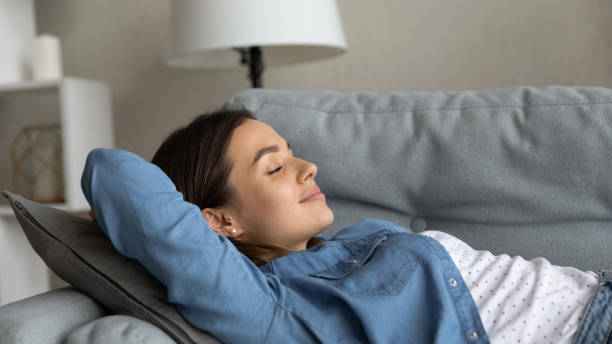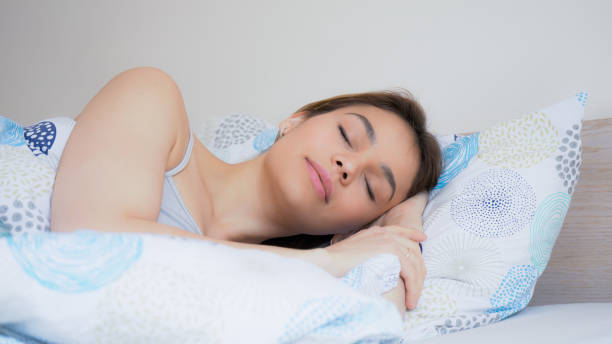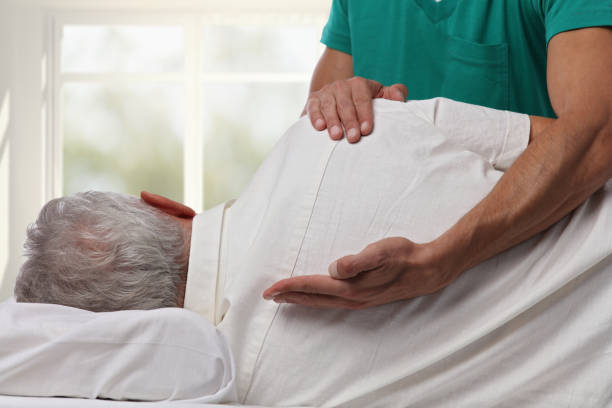Introduction

When finding relief from back pain, sleep plays a crucial role. Getting a good night's sleep is essential for your body to heal and recharge, but waking up frequently due to discomfort can make it difficult to achieve restorative sleep. That's why creating a sleep-friendly environment is essential for those seeking relief from back pain.
This blog post'll explore practical tips and strategies to optimize your sleep environment, ensuring a peaceful and pain-free night's sleep. Our guide will help you transform your bedroom into a tranquil and cozy environment that can alleviate back pain and enhance sleep. This includes selecting the correct mattress and pillows, maintaining an ideal temperature, and minimizing noise. Bid farewell to sleepless nights and wake up reinvigorated to tackle the day ahead!
The Link Between Back Pain and Sleep Disturbances
Inadequate sleep can contribute to back pain and other musculoskeletal issues. Maintaining a healthy spine requires getting enough sleep. If you experience sleep disturbances, it could worsen any existing or chronic back pain. Sleep disturbances interfere with the body's ability to heal itself from injuries and recover from the wear and tear of daily activities.
When you don't sleep enough, your body may produce stress hormones that can lead to discomfort and swelling. This can lead to discomfort and stiffness in your back. Sleep deprivation also reduces serotonin levels, which helps regulate moods and emotions. This can lead to depression or anxiety, increasing the risk of back pain.
Research has indicated that sleep quality is equally significant as the duration for diminishing and controlling back pain. People with chronic or acute lower back pain are likelier to experience difficulty sleeping, including frequent wake-ups and shallow sleep. Inadequate sleep leads to higher muscle tension and fatigue in the morning, exacerbating shoulder and lower back pain.
How Sleep Affects Back Pain
Here are some effects of Sleep on Back Pain:
Lack of proper sleep can increase pain levels. Individuals with long-term back pain often struggle to achieve restful sleep because lying in bed causes pain or discomfort.
Not getting enough sleep can cause muscle tension, worsening back and neck pain.
Insufficient sleep may also lead to heightened stress levels and exacerbate back pain.
7 Ways to Create a Sleep-friendly Environment for Back Pain Relief

Here are 10 simple ways to create a sleep-friendly environment that will provide relief from back pain:
Use a supportive mattress and pillow:
A supportive mattress and pillow can help you get the right support while sleeping to ensure that your back muscles are well-aligned for maximum comfort. Memory foam mattresses, latex mattresses, adjustable beds, or even air-filled mattresses may be ideal for those with back pain.
Select a firm mattress to support your body's natural shape and sleeping positions. Additionally, supportive pillows between the legs, behind the neck, and under the head can help reduce pressure points in the back while sleeping.
Sleep on your side or back:
To ease back pain, it is advised to sleep on your back or side. It helps maintain proper spine alignment and alleviates pressure that can cause pain in other body parts.
If you're prone to rolling over onto your stomach while sleeping, try placing a wedge pillow between your legs to help keep you in the correct position. Consider wearing a sleep brace or foam wedges and rolls around your body for additional support.
Also, be sure to keep your neck and spine in proper alignment by adjusting the height of your pillow so that it's not too high or too low. Doing this can help reduce neck pain and prevent your spine from being pushed out of its natural alignment while you sleep.
If you struggle to remain comfortable on your back or side, try experimenting with different types of pillows and wedges until you find the perfect combination. Alternatively, if one position is causing more pain than relief, try sleeping in another.
Adjust the room temperature and humidity:
3. Adjust the room temperature and humidity: To ensure a good night's sleep, it is important to ensure your sleeping environment is comfortable. Attempt to maintain a comfortable room temperature to unwind without experiencing excessive warmth or chilliness. Ensure your bedroom is moderately humid, as this can build up condensation that might cause discomfort. If necessary, adjust the humidity levels using a dehumidifier or air conditioner.
Avoid caffeine before bedtime:
Caffeine possesses stimulating properties that may hinder relaxation and cause difficulty falling asleep. Avoid drinking coffee, tea, or any other caffeinated beverage for at least six hours before bedtime. If you must have caffeine, try switching to decaffeinated drinks or limiting your intake to one cup daily.
Avoid alcohol before bedtime:
Drinking alcohol can disrupt sleep by causing frequent awakenings at night, leading to fatigue and decreased daytime alertness. Additionally, drinking too much alcohol can exacerbate back pain as it increases inflammation and reduces serotonin levels, a neurotransmitter responsible for regulating pain. To improve your sleep quality, it is advised to avoid drinking alcohol for at least four hours before going to bed.
Avoid eating late in the evening:
Eating large meals close to bedtime can cause indigestion and heartburn, leading to discomfort. Light snacks such as whole-grain crackers or a small bowl of cereal may be preferable if you need something to eat before bed. Additionally, try to avoid drinking high-calorie drinks late at night, as these can add extra calories that can lead to weight gain and contribute to back pain.
By creating a sleep-friendly environment and making small changes to your sleeping routine, you can get the relief from back pain that you need to enjoy quality sleep. These strategies improve your symptoms as you experience greater comfort while sleeping. Remember to regularly reassess your sleeping environment to ensure it provides enough comfort and support for your back.
How should I sleep to relieve back pain?

Getting enough high-quality sleep is essential for managing back pain effectively. Poor sleeping habits can cause or aggravate back pain, and getting enough restorative sleep can help mitigate discomfort. To improve your sleep quality when experiencing back pain, consider these suggestions:
1. Change your mattress: An unsupportive mattress can worsen back pain, so investing in one that provides good support is important. Consider replacing your mattress with a newer one that provides better support for your spine and body weight if it is over seven years old.
2. Sleep in the right position: Sleeping on your side or back can help keep the spine aligned and reduce pressure on the back. Consider placing a pillow between your knees while sleeping to stabilize your pelvis and reduce strain on your lower back. It's also advisable to avoid sleeping on your stomach as it can cause more stress on your neck and spine.
3. Use lumbar support: Add extra cushioning to your bed to improve comfort and support for your lower back. You may place a lumbar support pillow or roll a towel behind your lower back for extra comfort.
4. Make time for morning stretches: Doing some gentle stretching before you get out of bed in the morning can help relieve tension in your back and increase your flexibility.
5. Avoid late-night activities: To alleviate nighttime pain and discomfort, it is advisable to refrain from engaging in activities that may strain the back, such as using a computer or lifting heavy items.
Following these tips can help make getting a good night's rest easier and reduce back pain. Be mindful of your body and adjust the advice accordingly. If the pain continues or worsens, seeking advice from a healthcare provider is recommended.
Conclusion
The article has tips on creating a more comfortable sleeping environment to help reduce back pain. With the right mattress, sleep position, lumbar support, and morning stretching routine, you can ease your discomfort at night and improve your overall well-being.
FAQ's
What is the most efficient position to sleep for back pain?
To alleviate back pain while sleeping, lying on your side or back and using a pillow between your knees is best. Another tip is to use a lumbar support cushion to support your lower back. Additionally, it's best to avoid sleeping on your stomach, as this position can exacerbate the strain on your neck and spine.
What is the fastest way to relieve back pain at home?
At home, you can practice stretching and strengthening exercises to help relieve back pain. Additionally, try to create a sleep-friendly environment by investing in a supportive mattress and using additional cushioning for your lower back. Avoid engaging in activities that strain your back, like lifting heavy items or using a computer right before sleep.
How to reduce lower back pain?
To reduce lower back pain, practice strengthening exercises targeting the core and lower back muscles. Additionally, get enough restful sleep in a comfortable position with support behind your lower back. If needed, consult a medical professional for further advice.
Is lying in bed good for back pain?
Yes, lying in bed can benefit back pain, as long as the proper support is available. For a better sleeping posture, you can place a pillow between your knees and a lumbar support cushion behind your lower back while sleeping on your back or side. For additional support, use a lumbar cushion behind your lower back. Remember to avoid sleeping on your stomach, as it may cause strain on your spine and neck.
Is it good to sleep without a pillow?
It is not recommended to sleep without a pillow, as it can lead to an uncomfortable sleeping position and might even worsen existing neck and back pain. Try using a supportive pillow to keep the spine aligned while sleeping. Additionally, place a lumbar support cushion or rolled-up towel behind your lower back for extra comfort.

